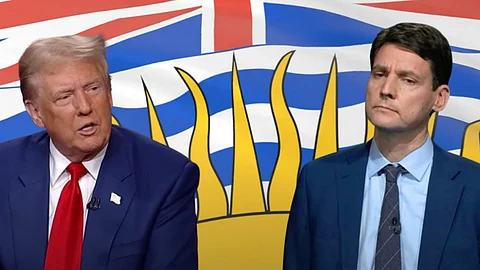

The government of British Columbia has warned that, if implemented, Donald Trump's tariffs would have a major impact on the provincial economy.
Premier David Eby and Finance Minister Brenda Bailey broke it all down during a press conference on Thursday.
Bailey explained that, were the president to go forward and enact a 25% tariff for the duration of his term, the province's real GDP would experience a cumulative loss of around $69 billion by 2028.
In regards to employment, there would be an estimated 128,000 fewer jobs by 2028, with an increase in the unemployment rate from 6.7% to 7.1%. Corporate profits were projected to result in losses of between $3.6 billion and $6.2 billion annually, with government revenue falling by anywhere from $1.6 billion to $2.5 billion per year.
Eby made it clear that his government was taking Trump's commitment to impose tariffs on Canadian goods "very very seriously," calling it a "direct economic threat to BC families."
He vowed to "respond in a way that protects families and ensures that we minimize the risk of any future attack like this from the United States."
While Eby ruled out the use of retaliatory tariffs against the Americans, he outlined a number of measures the province was exploring. These included reducing dependence on the US by strengthening relationships with other overseas trade partners, and trying to convince those in Washington, DC who Trump actually listens to that his neighbours to the north are his greatest allies and integral to both nations' success.
He drew particular attention to the rare minerals that come out of Trail, pointing out that the only other country that produces such raw materials is China. The US requires them for night vision goggles and other products, and with no desire to procure them from China, their only option was BC.
The premier noted that any decisions will be made via a "Team Canada" approach alongside federal leaders and his provincial counterparts.
